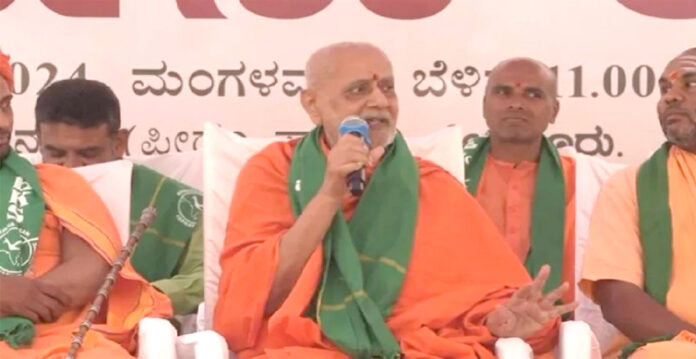Amid the ongoing controversy surrounding the Waqf Board in Karnataka, Kumara Chandrashekaranatha, the seer of the Vishwa Vokkaliga Mahasamsthana Mutt, has stirred fresh debate by suggesting the enactment of a law that would deny voting rights to Muslims.
Speaking at a protest meeting organized by the Bharatiya Kisan Sangha, the seer made a provocative claim that such a law exists in Pakistan, where non-Muslims are not allowed to vote. He called for the implementation of a similar law in India and also demanded the abolition of the Waqf Board, which has become a focal point of controversy in recent weeks.
The Waqf Board controversy has intensified following reports that several farmers and landowners in the state have received notices claiming that their lands are now designated as Waqf properties. This has sparked widespread protests across Karnataka, with BJP leaders and members of farmers’ organizations voicing strong opposition.
Also Read: Parliamentary Committee on Waqf bill to meet today
“The Waqf Board is unlawfully claiming ownership of farmers’ lands and buildings, without any proper documentation or records. This is a grave injustice,” said Kumara Chandrashekaranatha during his speech. “It is not dharma for the Waqf Board to assert such rights over private properties. If their properties were taken away, would they remain silent? Of course not,” he added, referring to the Waqf Board’s controversial land claims.
The seer also emphasized the importance of protecting farmers’ lands, asserting that they are the backbone of the country’s agricultural economy. “Farmers are the ‘annadathas’ (food providers) of our nation. We must protect their lands and assets from being seized unjustly,” he said. “We do not hate anyone. We are peace-loving people who live in harmony with all communities, but we cannot tolerate injustice, especially when it affects the livelihoods of our farmers.”
In his speech, the seer also raised concerns over violence against Hindus in neighboring Bangladesh, stating, “In Bangladesh, many innocent Hindus have been killed. This is unacceptable.” His comments have added fuel to the already heated debate surrounding religious tensions and land disputes in the region.
The controversy began when several farmers in Karnataka received notices from the Waqf Board, which claimed certain lands as Waqf properties under its control. Many of these lands were previously owned by farmers and institutions, prompting fears of land grabs and an infringement on property rights.
Protesters have accused the Waqf Board of overstepping its authority and unlawfully asserting control over private land. In response, BJP leaders and farmers’ organizations have called for the government to intervene and ensure that farmers’ lands are protected from what they perceive as encroachment by the Waqf Board.
As the protests continue to gain momentum, the calls for the abolition of the Waqf Board and a review of its powers have become louder. Whether the seer’s controversial remarks will influence the ongoing debate or lead to new political alignments remains to be seen, but the issue is clearly one that will dominate discussions in the coming weeks.
(This story is sourced from a third-party syndicated feed. Raavi Media takes no responsibility or liability of any nature. Raavi Media management/ythisnews.com can alter or delete the content without notice for any reason.)


